Peter MALONE
Saturday, 09 October 2021 12:59
Call Girl
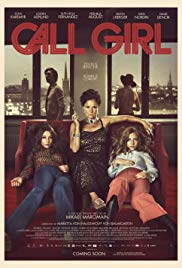
CALL GIRL
Sweden, 2012, 140 minutes, Colour.
Sofia Karmyr, Simon J.Berger, Pernilla August.
Directed by Mikael Marcimain.
While this film offers matters of interest for international audiences, is so specifically Swedish, with situations from the 1970s, political elections, political corruption, that it is a film for the home audience while international audiences might observe.
While the setting for the film is the 1970s into the 1980s, audiences will be able to parallel similar political situations and corruption from their own experiences, from their own countries.
The Wikipedia entry is succinct.
� The story is a fictionalised version of events based on the so-called Bordellhärvan political scandal of 1970s Sweden which linked several prominent politicians to a prostitution ring that included underage girls.
Set against the backdrop of the 1976 election, the story is centred on delinquent teenager Iris (Sofia Karemyr), who is sent to live in a juvenile home. She meets Sonja (Josefin Asplund) there and the two regularly slip away for adventures in the city. Together they are recruited to the prostitution ring operated by Dagmar Glans (Pernilla August), a madam well-known to the authorities. Dagmar's clients are mostly rich and powerful men, including senior politicians of the day. She becomes the subject of a police investigation led by a young vice officer, John Sandberg (Simon J. Berger). Sandberg soon discovers Glans has powerful clients but also finds his investigation hampered by his superiors and his life threatened by sinister figures. Police break up the prostitution ring but the powerful clients avoid being named in the scandal and Dagmar's trial concludes with her receiving a suspended sentence before Iris can testify about being an underage prostitute. In the aftermath of the trial, Sandberg is killed in a hit and run incident and his report into the affair is classified by the newly elected government. The film ends with Iris running away from the juvenile home, her ultimate fate ambiguous.�
Published in Movie Reviews
Published in
Movie Reviews
Saturday, 09 October 2021 12:59
Camino Skies
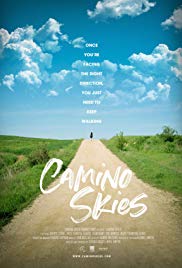
CAMINO SKIES
New Zealand, 2019, 80 minutes, Colour.
Directed by Fergus Grady, Noel Smyth.
The immediate audience for this documentary film from New Zealand are those who have walked the Camino, especially the route across the top of Spain from the Pyrenees to Compostela. It is the kind of film that will bring back many memories, joyful memories, probably some exhausted memories, lots of comparisons of different experiences.
The more long-term audience for Camino Skies would be those who are contemplating doing the walk, checking on their motivations, whether they be humanistic for non-believers or spiritual for believers. The selected characters in this film are proof that the 800 km walk is possible for a wide range of men and women, even for those who are older than they used to be.
Audiences keen on the Camino will have seen Emilio Estevez’ feature film, The Way, featuring Martin Sheen and a cross-section of pilgrims with a cross-section of motivations making their way across Spain. Then there was a documentary, The Camino, Six Ways to Santiago, a bigger budget than for this film and a larger number of characters, especially from North America and from Europe.
This is a New Zealand production. The pilgrims are from New Zealand and Australia who are joined by a woman from Belgium. They are presented as very ordinary people, especially as we are introduced to a 70-year-old woman who suffers from severe arthritis for whom the Camino proves to be something of a way of the cross, often painful, but ultimately triumphant. There is a woman in her 50s whose husband has died and she walks the way with a combination of both grief and hope. There is a friendly elderly man and a middle-aged man, one might think not immediately built for such a long walk, but his daughter has died of illness and he is trying during the walk to find some meaning for what has happened to his daughter.
And so, we accompany these people, meeting a number of other cheerful people on the way, fellow pilgrims, providers of hospitality…
And, there is always the Spanish countryside, the flat plains, mountains and hills, some rough going, some highways, always the possibility of getting lost.
For those who are not going to walk the Camino and have no intention of doing so, they will probably observe with some interest, some sympathy for the characters, but, perhaps, observing it at something of a distance.
However, it is an amazing phenomenon, the Camino, increasing numbers walking it, some alternate routes, even from Lisbon to Santiago. We are told that more than a quarter of a million people walk the Camino each year.
While the Camino has religious origins, and there is a brief introduction and explanation by Filipino Salesian priest, it is both a spiritual and secular pilgrimage, an alternative to being continually busy, a possibility for reflection if not contemplation, a challenge for self-assessment, probing some of the deeper meanings of what it is to be alive, to be joyful, to suffer, to be young, to grow old.
The films on the Camino remind us that while we are surrounded by secular and secularised culture, there are further questions to be asked and further answers to be discovered.
Published in Movie Reviews
Published in
Movie Reviews
Saturday, 09 October 2021 12:59
Pariah
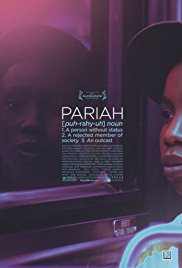
PARIAH
US, 2011, 86 minutes, Colour.
Adepero Oduye, Pernell Walker, Aasha Davis, Charles Parnell, Kim Wayans.
Directed by Dee Rees.
Pariah is a brief film of 2011, a small portrait of an African- American teenager, her life at home and relationship with her parents, her relationship with friends, her discoveries about herself and, especially, her sexual orientation.
The film was written and directed by Dee Rees who was Oscar-nominated for her fine film about race relationships during the 1940s, Mudbound.
Adepero Oduye gives a complex performance as the teenager, Alike, preoccupied with herself and her orientation, bonding with friends despite suspicion of parents.
The film raises serious issues about orientations in the context of family, school, friendships.
1. A film for American audiences? Black American audiences?
2. A film about sexual orientation, a young girl, black girl, teenager? Confusion? Discovery? Future?
3. The setting, the family, the role of the parents, sister, school, friends, clubs and outings? The musical score?
4. The city setting, the neighbourhood, homes, streets, meeting venues?
5. The character of Alike? Her age, behaviour, identity, questions, female attraction, the influence of her father, the demands of her mother? Approval and disapproval of friends?
6. The details of her life, at home, school, education, social life?
7. Her friendship with Laura, Laura’s personality? Others dislike of Laura? The meetings, discussions, friendship, intimacy? Alike finding her own identity?
8. The encounter with Bina, the attraction, the effect on Alike, the effect on Laura?
9. The serious discussions, audience response to the different points of view, sympathy towards Alike, sympathy towards her mother? Or not?
10. The future, Alike and her relationships, the effect on her life?
Published in Movie Reviews
Published in
Movie Reviews
Saturday, 09 October 2021 12:59
Ophelia
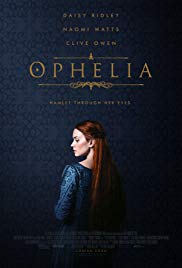
OPHELIA
UK, 2018, 114 minutes, Colour.
Daisy Ridley, Naomi Watts, Clive Owen, George Mackay Tom Felton, Dominic Mafham, Devon Terrell.
Directed by Claire Mc Carthy.
Ophelia. No further identification necessary (just as with those other Shakespearean leading ladies, Desdemona, Portia, Cordelia…).
At once, most of us think of Hamlet. And, of course, he does appear in this story. But, as Ophelia’s voice-over reminds us that, while we have heard her story and think that we know all that went on in Elsinore, we have not heard all her story and this is her opportunity to tell it.
This is a very stylish re-creation of those events, costumes and decor, the castle on a rock, interiors, domestic life, pageantry – and venturing out into the countryside, the mysterious cave of a witch, the pool in which Ophelia floats with the flowers. The film is intriguing to look at and the score to listen to.
We first meet Ophelia as a little girl, servant family in the court, looking at the boy Hamlet from afar as he goes away for his studies. Ophelia is rather forthright, even at this young age, making comments to the court out loud – but, she captures Queen Gertrude’s attention and grows up as a lady in waiting. So, we are introduced to Daisy Ridley as a rather strong and vigorous Ophelia (just as Daisy Ridley was even more strong and vigorous in the recent Star Wars blockbusters). Naomi Watts is impressive as Gertrude, what we know of her, and even more detail of what we didn’t know, the coldness of her husband, the king, tentative attraction to Claudius (Clive Owen sinister and scheming).
So, we see the familiar events, some variations on the events, glimpses of familiar characters, Laertes and Horatio, the fawning Polonius.
But, there are characters that Shakespeare did not seem to know about, especially the witch in her cave with potions, rejected by Claudius, supplying drug relief to Gertrude, visited by Ophelia – who, ultimately reveals a lot of truth about the past which motivates the witch to side with the incoming soldiers to invade the palace. (She has another secret but that is for the audience to discover and relish.)
The audience will discover that there are some other details that Shakespeare got wrong! Some of Hamlet’s behaviour, advice to Ophelia about the nunnery, and who actually kills Claudius. One of the strange things as we watch this story is that we forget that, while we know all about them from Shakespeare, the characters themselves actually don’t know until they make decisions and act – which makes us impute some motivations to them which they haven’t quite developed as yet!
While Ophelia is about twenty, so is Hamlet, young, inexperienced, moody, forced into swordplay by Claudius, shocked at the death of his father, forced to kneel before Claudius the King, disappointed with his mother – and organising the players in quite a striking sequence, silhouettes and outlines lit behind a sheet-screen. He is played as somewhat ingenuous, romantic, and somewhat bewildered by George MacKay?. Tom Felton is Laertes.
For audiences who have no knowledge of Shakespeare’s play, this would prove an interesting costume drama. For those in the know, it is an intriguing sharing with Ophelia of what was happening behind the scenes (and, at the end, some significant borrowing from Romeo and Juliet) – and was Ophelia floating in the water the last to be seen of her?
The director is Australian Claire Mc Carthy (The Waiting City, The Turning).
1. The title, the focus? The story told, not told? Now telling it?
2. The impact for audiences who know Shakespeare’s play? Who know the characters, situations, interactions? Seeing them in a different light, different emphases? Interest, satisfying? The impact from those who do not know Shakespeare’s play?
3. Shakespeare and what he did not know, Gertrude and her sister, her sister’s story, hard done by Claudius, declared a witch, exiled in her cave, the potions, supplying them for Gertrude? Supplying the snake poison before Claudius? Ophelia visiting her, telling her the truth about Claudius? Her journeying with the invaders into the castle? The final scene with Gertrude?
4. Costumes, decor, the castle on the rock, the woods, the vistas, the cave, the pool? Castle interiors, pageantry, drama? The musical score?
5. Life in Elsinore, Hamlet and Gertrude, mother and her love for her son, the role of the courtiers, Horacio and Hamlet going to school? Ophelia and Hamlet as children, Ophelia calling out in the court, Gertrude taking her on, training to be a lady in waiting, the tasks, learning to dance, with the other members of the retinue? Rivalries?
6. Hamlet’s return, the attraction to Ophelia, their meetings, falling in love, she poor, he reckless? Gertrude and her response? Hamlet’s father, his severity with his son? Power? Claudius in the court, watching, the vicious swordplay with Hamlet? Ophelia, Laertes?
7. Ophelia seeing the ghost on the ramparts? Gertrude and her medication, Ophelia seeing the hooded figure, the fact that it was Claudius?
8. The death of the king, the court in shock, Hamlet’s return, the funeral? Claudius as King, commanding Hamlet to kneel? Marrying Gertrude? The previous images of their flirtation and the King watching?
9. Laertes, relationship with his father, Ophelia, going to study? Polonius and his flattery, the variation on his famous speech? Spying on Hamlet, everybody watching Hamlet and Ophelia? Hamlet and his performing, the advice about the nunnery? The whispered advice? The later account of Hamlet killing Polonius by mistake? Laertes and his motivation, the backing of Claudius, urging him to fight Hamlet? Supplying the poison?
10. Aspects of Romeo and Juliet, the friar marrying the couple, the various potions, seeming dead, reviving?
11. The arrival of the players, Hamlet and his plan, the performance, the silhouettes, the sheet-screen? The allegory? Claudius calling for the lights, upset?
12. The orders for Rosencrantz and Guildenstern? The ship stalled? Hamlet alive? Ophelia, the arrangements for her to marry, the suitor, her earlier defiance and defence of the serving maid? Getting the potions from Gertrude’s sister? Her love for Hamlet, the love scene, her pregnancy? Hamlet’s return?
13. The setup for the duel, the poison on the sword? Claudius wanting a wager, Gertrude watching? Gertrude cutting Ophelia’s hair, her disguise in the palace as a servant, the encounter with Hamlet, pleading for him to leave? To go to the nunnery which he had urged when simulating madness with Ophelia?
14. The fight, the clash, the deaths, Gertrude and her anger, her killing Claudius? Her taking the poison?
15. The invasion, Gertrude’s sister and her participation, the viciousness?
16. The nunnery, Ophelia and her escape, climbing the cliffs, welcome to the convent?
17. The film as a re-look at Shakespeare’s play, other aspects of its narrative?
18. Ophelia, telling her story, her daughter, her life?
19. A satisfying imaginative interpretation of the play?
Published in Movie Reviews
Published in
Movie Reviews
Saturday, 09 October 2021 12:59
Red Sea Diving Resort, The/ Operation Brother
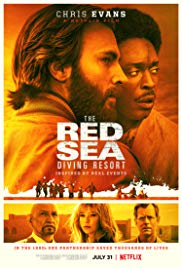
THE RED SEA DIVING RESORT/ OPERATION BROTHERS
US, 2019, 129 minutes, Colour.
Chris Evans, Alessandro Nivola, Haley Bennett, Ben Kingsley, Michael Kenneth Williams, Greg Kinnear, Michael Huisman, Mike Ivanir.
Directed by Gideon Raff.
Audiences who come across this Israeli story may immediately think of the events at Entebbe, 1976. This rescue of hostages was well publicised at the time, then to feature films being made. However, this episode of rescue made the news but has not stayed in world memory. This re-creation of the events may help rectify this.
The working title for the film was Operation Brothers, a very worthy title but not particularly startling. On the other hand, there is certain curiosity about resort, a diving resort, on the Red Sea, but on the Sudanese coast.
The opening provides some historical background and perspective. It concerns the famous “Ethiopian Jews�. Living in Ethiopia, they trace their Jewish origins to the visit of the Queen of Sheba to King Solomon, her giving birth and, for over 2500 years, a community built up. With the uprisings in the 1970s and massacres in villages in Ethiopia, this community wanted help to migrate to Israel, to go to Jerusalem.
The writer-director, from Israel, but often working in the United States, has been responsible for a number of political/espionage thrillers including episodes of the television series, Homeland.
While we are introduced to the community at the opening of the film, seeing the insurgents and their cruelty, we see a group being rescued by Israeli (with US backgrounds) operatives, rescuing a boy from the cornfields, escaping to refugee centres in Sudan, hoping for international aid to transport the thousands of refugees in the centres. The two Americans are played by Chris Evans, Ari, going effectively beyond his nice-guy Avenger, Captain America, Alessandro Nivola, Sammy, a doctor.
In Sudan, they are in contact with a CIA representative, Greg Kinnear, whom they will ultimately rely on for the final rescue.
Ari is a risk-taker, considered reckless, but enthusiastic in his mission to rescue the Ethiopian Jews, proposing it to government officials, represented by Ben Kingsley, and a government Minister (Mark Ivanir). Permission is granted but the project is severely supervised, permission is reluctant and liable to be revoked.
Ari’s plan is to take over a failed diving resort on the Red Sea, do a makeover, recruit an international group of agents (which we see) and use this as a base to take out on floating barges the refugees to a waiting ship. In fact, a group of German tourists suddenly turn up, confusing the issue, but in providing a respectable cover for the operation.
The screenplay is not particularly flattering to the Sudanese authority, the money corruption required to get the rights to lease the resort, the ever-present soldiers, their presumptions, their brutality, seeking out smugglers, shooting hostages.
While the audience knows that the mission was ultimately successful in the thousands of refugees who were transported to Israel, it is in the detail of each of the missions, the threat of the military, the risk of imprisonment, the detail of the rescues that makes the film exciting and watchable. This is especially true of the finale, a rescue by plane.
And the film ends with newsreel footage, quite extensive, of the actual events.
1. The title? The focus? The social concern of the alternate title
2. Based on a true story, audience awareness of the story? The end of the 1970s, the 1980s? An Israeli story?
3. The background of the Ethiopian Jews, the story of the Queen of Sheba, their being her descendants, waiting to return to Israel, to go to Jerusalem?
4. 1979, uprisings in Ethiopia, the brutality, massacres in the villages, the insurgents, the people trying to escape, the religious fervour, identities as Jewish?
5. Ari and Sammy? Their backgrounds? The involvement in the rescue, the truck, the mother concerned about her son playing in the fields, Ari going to rescue him, the pursuit by the insurgents? The escape?
6. The refugees in sedan, in the refugee camps, the Jews hidden amongst so many refugees? The government, dictatorship, the military, the attitudes of the West?
7. The role of Ethan Levin? With the government, the discussions with the Minister? Ari and his proposal? The rescue of the Ethiopian Jews and bringing them to Israel? The idea of the Resort, its failure, on the Red Sea? A bargain? The plan?
8. Ari, separated from his wife, his daughter and her drawing showing him absent, explaining he was at work? A man of action, taking risks, seen as reckless? Determined?
9. Sammy as a Dr, the injury to his hand, working with Ari, going back to practice, Ari trying to persuade him, his being able to be persuaded by Ari? Following him – like a puppy? His willingness to be involved in action with risks?
10. The plan, the resort, the ship cover in the red Sea, the inflatables for the rescue?
11. Ari, his recruiting, internationally, the visits, the men, Rachel? Organising them, their backgrounds, the Mossad connection? Their covers, flying into the sedan?
12. The setting up of the resort, distant from the capital, the irony of the German tourists arriving, the drive, their being allowed to stay – and providing a cover for the operation?
13. The locals, jobs? The military visits, the leader, smiling, ruthless, enjoying the meals, yet interrogations?
14. The execution of the plan, collecting the refugees, radio connection, the inflatables, going to the ship, the numbers on the shelves indicating how many were saved?
15. The presence of the CIA in Sudan? Beau and, his knowledge, presence, the interviews with Ari? Ari appealing to him for help? His plea for the plane, the bone would be remembered for this? The challenge? Beau and and his arrival, the massacres by the military of refugees who refused to give information? His presence on the plane?
16. The military, suspecting smugglers, Ari and the vehicle crashing through, the military firing, the later interrogation by the commander? His presence at the table, meals, threats?
17. Tourists, scuba diving, a respectable cover?
18. Ari, character, leadership, always having an answer, the arrest, the blood, appealing to the official from whom they had got the permit for the resort? They’re being freed? Ari and Sammy and their argument?
19. The Israeli authorities, monitoring all the escapes, the discussions, the risks? Wanting to call off the mission? The Ethiopian man and his determination to stay behind?
20. The finale, the CIA getting the plane, the landing, the troops arriving, the number of refugees, pulling out that she is leaving them on the tarmac, the difficult takeoff, the arrival of Tel Aviv? Mission accomplished?
21. The achievement, the number of people saved, the final credits and the inclusion of so much footage from the actual experience?
Published in Movie Reviews
Published in
Movie Reviews
Saturday, 09 October 2021 12:59
Running out of Time
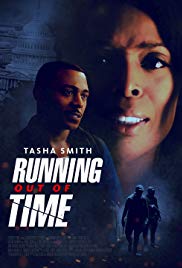
RUNNING OUT OF TIME
US, 2018, 90 minutes, Colour.
Tasha Smith, Ron Reaco Lee, Sean Dominic, Dustin Harnish, Paul Logan, Sydney Elise Johnson, Telma Hopkins.
Directed by Chris Stokes.
Basically, this is a home invasion thriller.
However, it starts with an interesting premise, the alleged suicide of the chief of staff of the candidate for the presidency. There is a memorial service, the candidate speaking highly of the dead man, his widow and daughter present, as well as his sympathetic assistant.
When the widow and daughter return home, accompanied by her mother, the Moody suddenly changed with masked men inviting the house. They have with them her husband’s assistant and his wife tied and taped in the back of the vehicle.
The intruders demand documents and files which the widow is aware of but knows that they are with the lawyer. The masked men ransacked the house in the search. They can find the widow and her daughter in the basement along with her husband’s assistant who says he was forced to bring them to the house.
So far, so expected but interestingly done. There is a twist as to who the villain really is which is also interesting – though, with all respect to the actor concerned, it is very difficult to imagine him as a vice presidential candidate, something he wants desperately and achieves.
The film then moves into somewhat sensationalist melodrama which undermines the serious themes. At one stage, the widow has a long discussion with her husband’s assistant while she is simply standing in bra and pants, more sensationalist than convincing!
The daughter is resourceful – and is able to get free, confront one of the masked men who is preparing a solution for the bath after his partner has been shot.
It is surprising then to see that the villain has become vice president and is at a social when the widow arrives, knowing that her husband was killed by a special poison dart which made it seemed that he had a heart attack after he had decided to go to the police with the incriminating documents against the presidential candidate.
With something of a smug smile, exerting glamour, she inserted dart into her enemy, he collapsing, she walking away – self-satisfied.
While interesting political background, the film then simply moves into melodrama.
Published in Movie Reviews
Published in
Movie Reviews
Saturday, 09 October 2021 12:59
Whisky Galore!/ 2016
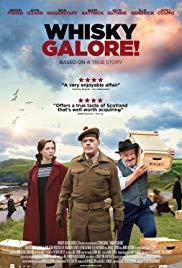
WHISKY GALORE!
UK, 2016, 98 minutes, Colour.
Greg or Fisher, Eddie Izzard, Sean Biggerstaff, Kevin Guthrie, Naomi Battrick, Ellie Kendrick, Alan Cuthbert, Fenella Woolgar, Bryan Pettifer, Tim Pigott Smith, Annie Louise Ross, James Cosmo, John Sessions.
Directed by Gillies Mac Kinnon.
1949, Alexander Mackendrick made a classic adaptation of the popular novel by Compton Mackenzie who also contributed to the screenplay. It is high on the list of the best of British comedies.
This is a 21st-century replaying of the story, set in 1941, rations in Britain because of the war, home guard in England to be ready for a possible invasion by the Nazis.
The setting is the island of Toddy, far off the coast of Scotland, a small number of inhabitants but Scots who appreciate the national industry, whisky-making. But then woes, because of restrictions during the war, they run out of whisky. The citizens are bereft, woebegone, making sad comments about cups of tea!
We are introduced to a range of characters on the island, led by Gregor Fisher as the postman who narrates the story. He is a strong personality and engages the audience with his presence as well as his storytelling. And he has two daughters of marriageable age, one in love with the local school teacher who is dominated by his absolutely horrendous mother, the other a member of the Armed Forces now returning from active service in Africa.
As expected, there are many characters on the island, the doctor, patients, home guard types who provide comedy, the local clergyman (James Cosmo) who gives a thundering Church of Scotland sermon on the commandments. In fact, the Sabbath is important because there can be no activity at all on the island. Which provides tension because a ship goes aground carrying a cargo of whisky but, midnight at the end of the Sabbath, everybody goes out to rescue the whisky and hide it.
The problem is that there is one of those intensely regulation-bound captains defending the island with the home guard. His played with rigidity by Eddie Izzard. There are further complications with the home guard itself, overpowering the young man returned from Africa who had trained them and has to guide them how to tie him up so that they get on with the smuggling. Then there are the Customs and Excise people who search for the whisky and the Islanders giving them quite a merry chase.
Happy endings all round, a ceremony to announce the engagement of the two daughters and the young men, even the cantankerous mother coming to the dance and having a whisky!
Many will review the classic but here is an opportunity to see it portrayed effectively and colourfully (with memories of Dad’s Army).
1. The status of the original, classic British comedy
2. A 21st-century interpretation? Memories of World War II? The Celtic imagination, sense of humour?
3. The setting, the island, hills, roads, woods? Sea, beaches, caves? The town, the streets, the homes, the pub? The church? The atmosphere of the island? The musical score and Celtic tones?
4. The title, Scots and the production of whisky, love of whisky? The scenes of drinking in the pub, friendship, bonds? The proprietor and his running out of whisky, the rations? His later behaviour, selling the whisky, losing out with the smuggling, giving the information to the authorities? The jokes about the absence of whisky, wry comments, cups of tea…?
5. The ship, foundering on the rocks, the over-confidence of the captain, abandoning ship, the cargo of whisky? The information? The Sabbath, the strict Scottish observance, no activity whatsoever except church? People looking at the boat, thinking about the whisky? Midnight, the overcoming of Sergeant Odd (and his training them and having to guide them what to do), his being found by Waggett? The expedition to the ship, the unloading of the whisky, the return, the storage in the cave, distribution of the whisky?
6. The narrative by Macroon? His age, postmaster at 22, his two daughters, his observations? His work at the Post Office? Activity at the pub? His two daughters and their being in love, his not wanting them to leave? The war situation, Captain Waggett and the discussions? Odd and his returning home and his courting the daughter? George teaching at the school and his courting the daughter? Macroon in charge, listening to the phone calls, diverting the attention of the authorities, hearing about the box and the letters of the Windsors, his rescuing them, reading the letters, the deal with the man searching for the letters?
7. George, teaching at the school, dominated by his mother, her absolute severity, his courting the daughter, her demands, her living in the house with the mother? The Sabbath, his mother locking him in his room? Getting out the window to help with the whisky? Getting drunk, going home, defying his mother? Her going to the party, drinking, mellowing and dancing?
8. The various characters in the town, the doctor and his demand to go through the barriers, his patients and their illness, reviving with the whisky? The various members of the home guard and the comic touches? The Minister, drinking the altar wine from the Catholics, his severe sermon on the commandments, yet his involvement with the whisky? The banns for the wedding?
9. Captain Waggett, his strictness with interpretation of the rules, unrelenting, not imaginative, Odd giving him ideas? His confiding in his wife? Her tolerance, wisecracks? Playing pool? His getting into a mess, going to the authorities, suspicious about the whisky, getting the customs officials to come, the search and the ingenuity of the islanders in concealing the whisky? Finally held up by the bike riders? Phone calls, flag signals, the truck, out of petrol and putting in the whisky?
10. The ceremonial for announcing the marriages, the drinking, the dancing? The ceremonies?
11. The officials, the colonel and the phone call, not wanting Waggett’s officiousness?
12. The British poking fun at themselves, at authorities – but enjoying the whisky galore?
Published in Movie Reviews
Published in
Movie Reviews
Saturday, 09 October 2021 12:59
Other People
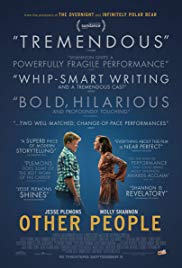
OTHER PEOPLE
US, 2016, 97 minutes, Colour.
Jesse Plemons, Molly Shannon, Bradley Whitford, Maude Apatow, Madisen Beaty, June Squibb, Paul Dooley, Matt Walsh.
Directed by Chris Kelly.
When we talk about other people, they are generally undergoing different experiences, experiences that we don’t have. In this film, it is pointed out that the central characters are the “other people�.
The film was written and directed by Chris Kelly, who wrote for Saturday Night Live and incorporates this background into his screenplay. He also uses the actual name of his mother, Joanne, for the mother who has terminal cancer. His alter ego in this film, David, has come out earlier, accepted by his mother, not by his father.
The narrative takes place over one year, signalled by the months. David has come to his home town of Sacramento to be with his mother in her final year, finding it lonely, with no one to confide in. He has broken with his partner. He is played by Jesse Plemons in a different kind of performance, bringing his character to credible life.
However, Molly Shannon’s performance as Joanne is well worth seeing, more subtle than many of Molly Shannon’s comic performances. She combines a sense of humour, seen as an improv concert, with the physical pain of her condition, the psychological repercussions, her relationships with her family, and with her husband, Norman, Bradley Whitford.
The film successfully combines its two themes, repercussions of sexual orientation, the reality of terminal illness and death.
1. The title? Not us…, But others? The central characters becoming ‘other people’?
2. Americans, the cross-section of American characters, white Americans?
3. The Sacramento setting, the city and the views, homes, streets, clubs? The visit to New York? The musical score?
4. The director, his experience in Saturday Night Live, comic writing? The personal story? His own mother and her name Joanne?
5. The opening, the whole family on the bed, Joanne’s death, the phone call, intrusive, the message about Joanne’s health? The story in flashbacks?
6. The period of the year, the designation of the months, time passing?
7. Joanne’s story, her background, her age, illness, a family with her, the severe cancer, the range of treatments, success and failure? The different effects on her? The visualising of her illness? Vomiting, weakness, hair and wigs, decisions about the treatment? Her love for Norman? Her love for David, for the two daughters? Their being together? Spending the year of illness with her? The development and collapse over the year, the pain, enjoying the improv concert, the visit to Paul in New York City, Skyping about the daughter’s wedding? Her will to live? The discussions about burial and cremation? Molly Shannon’s portrait of a woman dying of cancer, the subtlety of the performance?
8. David, Jesse Plemons, one year with his mother, his place in the family, writing for Saturday Night Live, success, writing the pilot, its not being accepted? Returning home to Sacramento, finding it confining? No one to confide in? The background of his coming out earlier, his mother making an apology for not supporting him sooner, the reaction of his father, not accepting his orientation, New York and going, but not entering the apartment with Paul? David and his attitude towards his father, the final change, the invitation to Paul, writing the check? David and the relationship with Paul, visiting Gabriel, Justin and his gay performance? The sexual encounter with Paul, the break? The website, the gay date? In the store, his breakdown in looking for the medication? Having to cope? The confrontation,the family on the bed? His future?
9. The portrait of the sisters, sympathetic, the place in the family, caring for their mother, their father? The wedding?
10. The world of the media, David and his friends, the friend with the Dracula teeth, their Skyyping at the time of the wedding, failing with the pilot, the success of the improv?
11. Audience response to a portrait of cancer, illness and dying? Audience response to the gay themes – the explicit themes and language? Combining them in the one film?
Published in Movie Reviews
Published in
Movie Reviews
Saturday, 09 October 2021 12:59
Spietato, Lo/ The Ruthless
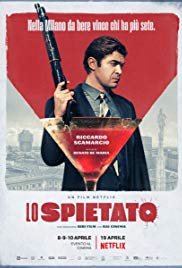
RUTHLESS/ LO SPIETATO
Italy, 2019, 111 minutes, Colour.
Riccardo Scamarcio, Sarah Seraaiocco, Alessio Pratico.
Directed by Renato De Maria.
There is a long and strong tradition of Italian films focusing on the Mafia and various associations for criminal activity. Most of them centred on the South, especially in Naples and in Sicily.
This is the story of a Calabrian family who moved from the south to Milan. The young son of the family becomes involved in criminal activity with his friends, is denounced by his father and spends some time in prison where he makes more associates.
While there is the family background and also the engagement of the central character to a young woman who is very pious, spending some of her life in atonement for her husband’s behaviour. However, during the wedding, her husband is arrested.
There are the expected activities of the Mafiosi type, abductions and extortions when the criminals are younger, changing as they grow older into more corporate corruption.
Riccardo Scamarcio has built up a career in Italy as well as internationally, often a dark and brooding screen presence – which suits his character in this film.
1. The title? Italian? Tone?
2. An Italian gangster film, the work of the director and his documentary on gangsters, the Mafia, variations on the stories of Mobs? The movie tradition, Italy, the US? The influence of Martin Scorsese and Goodfellas?
3. Costumes, decor, music of the period?
4. 20th century Italian criminals, from Calabria to Milan? Situations, settings?
5. Santo, his background, family, the move north, his life as a teenager, background, crime, his father putting him in prison, making him tough, his attributing success to his father? His friends and peers? The characters? Activities?
6. The gangs, the bonds between the men, their bravado, lack of conscience? The various jobs, the violence, extortion?
7. Santo, his fiancee, pregnant, the church, the wedding, the arrest? The devotion? Her piety and atonement for her husband’s sins?
8. The change in criminal activity, from abductions to infiltration of industry, corruption?
9. The portrait of a criminal and his activities? His arrest, the flashbacks? His assessment of his life?
Published in Movie Reviews
Published in
Movie Reviews
Saturday, 09 October 2021 12:59
We Belong Together
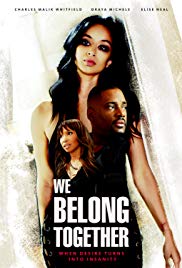
WE BELONG TOGETHER
US, 2018, 83 minutes, Colour.
Draya Michele, Elise Neal, Brian White, Cassidy Frlain.
Directed by Chris Stokes.
This is a time-passer thriller. It belongs to that large group of films which could be filed under “Fatal Attraction� variations.
At the centre of the film is a former college professor who suffered the loss of a child through SIDS and then became alcoholic, spending some time in prison, rehabilitation, AA, getting his feet on the ground again and resuming his career. One of the difficulties of his character is the strong screen presence of at the variations in his character which do not quite gel – his grief, love for his wife and daughter, the alcoholism, the almost-easy infatuation with one of his students and beginning an affair, not seeing through her rather obvious fatal attraction approach, his quite inconsistent behaviour with her compared with his love for his wife and daughter.
The femme fatale is the young woman who claims to have served in Iraq but in fact, as we learn, has been in a mental institution with her brother, both accused of setting fire to the house and the deaths of their parents. At least she has credibility in being quite inconsistent in her behaviour, manipulative, absolutely obsessive, moving into violence.
There is a murder early in the piece which is then left for quite some time, audiences thinking it was the young woman but a revelation at the end that was her brother – no explicit explanations of why he did it and his relationship with his sister.
On the sentiment side, there is the ex-wife who is still in love with her husband but getting a divorce, her strong-minded mother, the young daughter to whom both are devoted.
Not essential viewing – except for those who are cataloguing all the fatal attraction thrillers.
Published in Movie Reviews
Published in
Movie Reviews